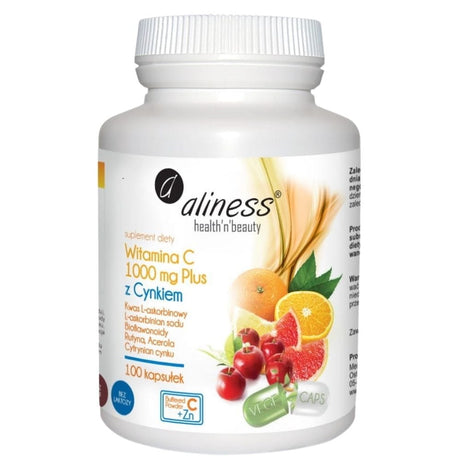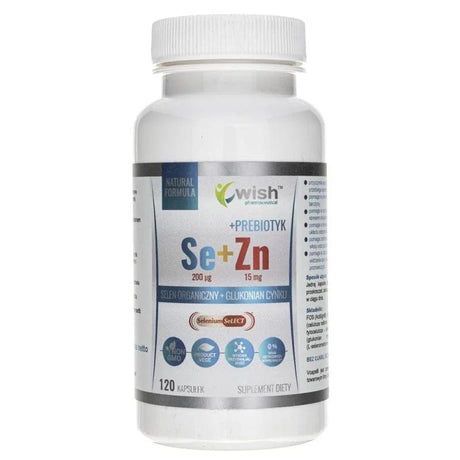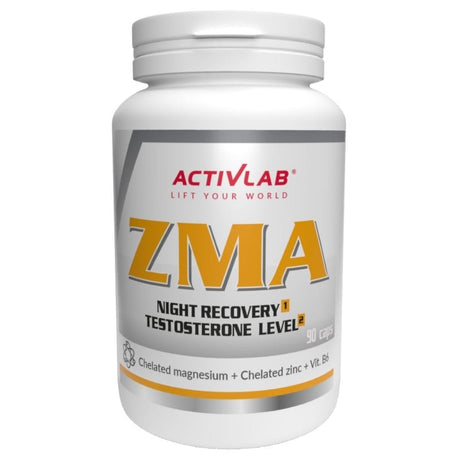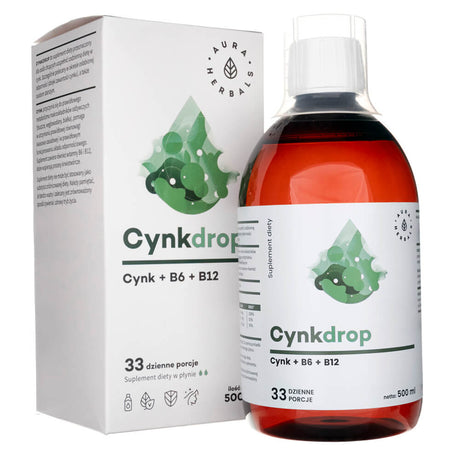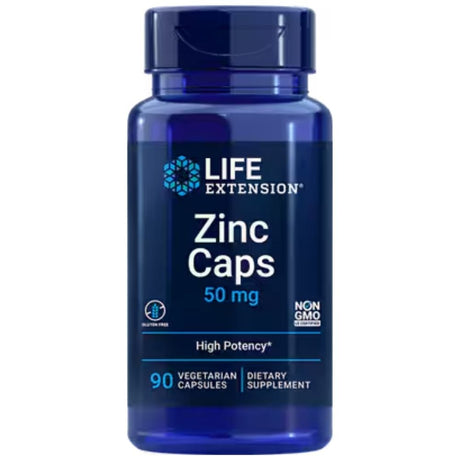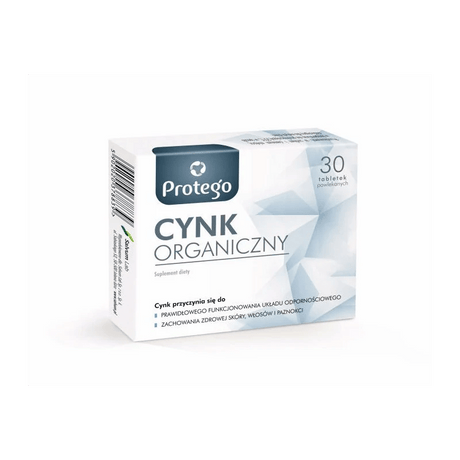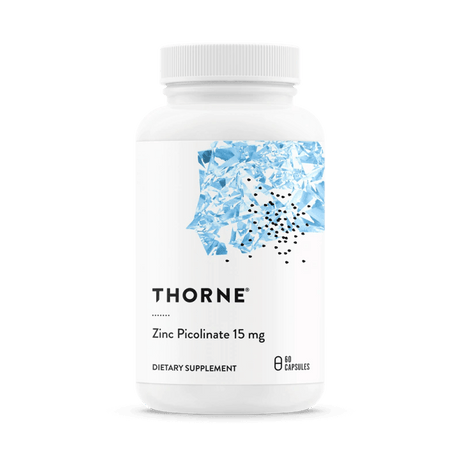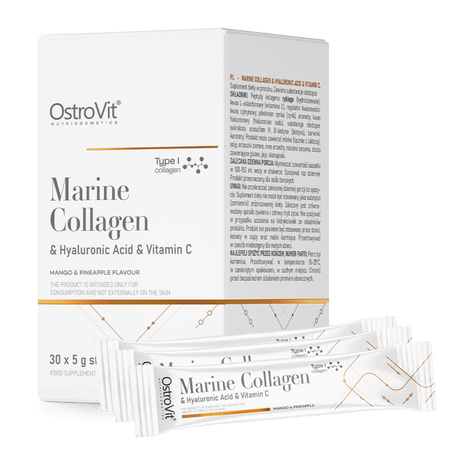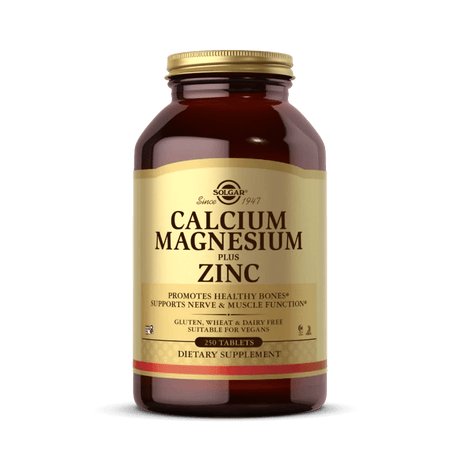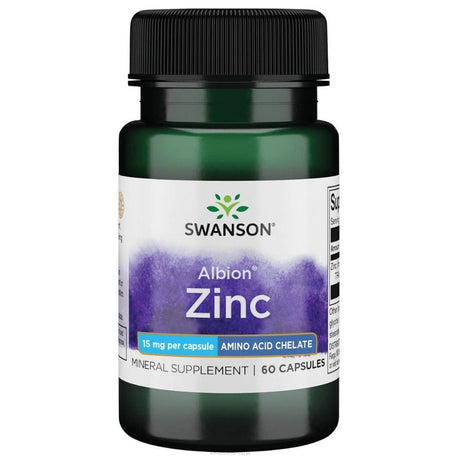Swanson
Swanson Zink-karnosin med PepZinGI - 60 kapslar
Ordinarie pris 224.09 krPris per enhet3.73 kr /itemEj tillgängligAliness
Aliness C-vitamin 1000 mg Plus med zink - 100 kapslar
Ordinarie pris 143.39 krPris per enhet1.43 kr /itemEj tillgängligNorsa Pharma
Norsa Pharma Nucleozin Complete - 60 kapslar
Ordinarie pris 291.29 krPris per enhet4.85 kr /itemEj tillgängligPurelab Marek Skoczylas
Skoczylas Zink 3 former, Koppar, EGCG och Quercetin - 60 kapslar
Ordinarie pris 159.09 krPris per enhet2.65 kr /itemEj tillgängligMedica Herbs
Medica Herbs Zinkchelat 15 mg - 60 kapslar
Ordinarie pris 36.99 krPris per enhet0.62 kr /itemEj tillgängligWish Pharmaceutical
Wish Selen 200 mcg + Zink 15 mg + Prebiotika - 120 kapslar
Ordinarie pris 80.69 krPris per enhet0.67 kr /itemEj tillgängligMedverita
Medverita ZMP Zink- och magnesiumcitrater P-5-P - 100 kapslar
Ordinarie pris 51.49 krPris per enhet0.43 kr /itemEj tillgängligYango
Yango Ekologiskt zink (Picolinat) - 90 kapslar
Ordinarie pris 81.79 krPris per enhet0.91 kr /itemEj tillgängligMedverita
Medverita Zinkcitrat 15 mg - 180 kapslar
Ordinarie pris 59.39 krPris per enhet0.33 kr /itemEj tillgängligMedverita
Medverita Zinkglukonat 15 mg - 180 kapslar
Ordinarie pris 51.49 krPris per enhet0.29 kr /itemEj tillgängligActivlab
Activlab ZMA (Magnesium, Zink, B6) - 90 kapslar
Ordinarie pris 117.59 krPris per enhet1.31 kr /itemEj tillgängligInvex Remedies
Invex Remedies Zn-Cu-Mg (Zink Koppar Magnesium) - 150 ml
Ordinarie pris 119.89 krPris per enhet79.93 kr /100mlEj tillgängligAura Herbals
Aura Herbals Zincdrop - Zink + B6 + B12, vätska - 500 ml
Ordinarie pris 63.29 krPris per enhet126.58 kr /lEj tillgängligLife Extension
Life Extension Zink 50 mg - 90 kapslar
Ordinarie pris 92.99 krPris per enhet1.03 kr /itemEj tillgängligSalvum
Protego Organisk zink - 30 tabletter
Ordinarie pris 25.69 krPris per enhet0.86 kr /itemEj tillgängligThorne Research
Thorne Research Zinkpikolinat 15 mg - 60 kapslar
Ordinarie pris 130.99 krPris per enhet2.18 kr /itemEj tillgängligPurelab Marek Skoczylas
Skoczylas Zink, Koppar och Grönt te-extrakt (EGCG) - 60 kapslar
Ordinarie pris 84.09 krPris per enhet1.40 kr /itemEj tillgängligPurelab Marek Skoczylas
Skoczylas Liquid VITZINC, Vitamin C + Zink - 30 ml
Ordinarie pris 94.39 krPris per enhet314.63 kr /100mlEj tillgängligAliness
Aliness C-vitamin 1000 mg Plus med zink - 30 dospåsar
Ordinarie pris 77.29 krPris per enhet2.58 kr /itemEj tillgängligSolgar
Solgar Zinkcitrat 30 mg - 100 vegokapslar
Ordinarie pris 132.29 krPris per enhet1.32 kr /itemEj tillgängligFormeds
Ordinarie pris 59.39 krPris per enhet123.73 kr /100gEj tillgängligOstrovit
Ostrovit Marint kollagen, Hyaluronsyra, C-vitamin, Mango-Ananas - 30 x 5 g
Försäljningspris 259.28 kr Ordinarie pris 288.09 krPris per enhet8.64 kr /itemEj tillgängligSolgar
Solgar Kalcium Magnesium Plus Zink - 250 tabletter
Ordinarie pris 240.99 krPris per enhet0.96 kr /itemEj tillgängligSwanson
Swanson Albion Zinc 15 mg - 60 kapslar
Ordinarie pris 33.59 krPris per enhet0.56 kr /itemEj tillgänglig
Zink: Det oumbärliga mikronäringsämnet för optimal hälsa
Zink är ett viktigt mikronäringsämne med långtgående effekter på många fysiologiska processer. Dess betydelse för att upprätthålla en korrekt immunfunktion, främja fertilitet, och stödja hud, hår, och nagelhälsa kan inte överskattas. Med tanke på dess viktiga roll för att upprätthålla hälsa och förebygga sjukdomar, är det viktigt att säkerställa ett tillräckligt zinkintag genom kost eller tillskott.
De unika egenskaperna hos zink
Zink är ett kemiskt grundämne som människokroppen inte kan syntetisera på egen hand, vilket gör kostintaget avgörande. Zink absorberas främst via matsmältningssystemet, men små mängder kan också komma in i kroppen via andningsorganen och huden. Biotillgängligheten av zink kan variera avsevärt, påverkad av faktorer som fytater och kostfiberintag.
Viktiga egenskaper och funktioner hos zink inkluderar:
- Stödjer kardiovaskulära systemet
- Skyddar mot fria radikaler
- Reglerar inre organfunktioner
- Påverkar genstabilisering och genuttryck
- Stimulerar immunförsvaret
- Upprätthåller cellintegriteten
- Påverkar syra- och basbalansen
- basbalans
Zink spelar en avgörande roll i sammansättningen av strukturella proteiner och är allmänt distribuerat i nervsystemet, särskilt i hjärnan. Här, fungerar det som en modulator av synaptisk transmission, med brister som potentiellt kan leda till neuropsykiatriska förändringar. Forskning har till och med föreslagit en koppling mellan zinkbrist och utvecklingen av Alzheimers sjukdom hos äldre.
Zinkens omfattande effekter på kroppen
Zinkens inflytande sträcker sig till många kroppsfunktioner:
- Enzymfunktion: Zink är en viktig komponent i många enzymer, inklusive DNA- och RNA-polymeras.
- Proteinsyntes: Det spelar en viktig roll i syntesen av proteiner, hormoner, och röda blodkroppar.
- Hud- och slemhinnans hälsa: Zink är viktigt för att dessa vävnader ska fungera korrekt.
- Stöd för immunsystemet: Tillräckliga zinknivåer kan bidra till att lindra symtomen och förkorta sjukdomstiden vid förkylningar och influensa.
- Reproduktiv hälsa: Zink är involverat i spermatogenesen och testikelutvecklingen, vilket säkerställer korrekt spermiestruktur och antal spermier.
- Hudhälsa: Det hjälper till att upprätthålla en frisk hud, hjälper till vid sårläkning, och påverkar kollagenmetabolismen.
- Ögonhälsa: Zinktillskott har visat sig vara effektivt för att behandla och förebygga åldersrelaterad makuladegeneration (AMD).
- Tillväxt och utveckling: Det har gynnsamma effekter på viktökning, nervsystemet, och benutveckling.
Kostkällor för zink
Animaliska produkter är de bästa källorna till zink, växtbaserade livsmedel innehåller också denna viktiga mineral. Införliva dessa zinkrika livsmedel i din kost:
- Fisk och skaldjur (särskilt ostron)
- Kött (särskilt lever)
- Fisk
- Ägg (särskilt äggulan)
- Nötter och frön
- Fullkornsprodukter
- Baljväxter
En balanserad kost som är rik på animaliskt protein och växtprodukter kan främja zinkabsorptionen på 20% - 40%. Men, ett högt intag av kostfibrer kan minska absorptionen avsevärt till ca 10-15%.
Optimering av zinktillskott
När du kompletterar med zink, är tidpunkten avgörande:
- Undvik att ta zink på fastande mage på morgonen, eftersom det kan orsaka illamående och buksmärtor.
- Ta zink senare på dagen, mellan måltiderna snarare än under dem, för att förbättra absorptionen.
- Var medveten om potentiella interaktioner med andra näringsämnen och mediciner, såsom kalcium, järn, ibuprofen, och aspirin.
- Rådfråga sjukvårdspersonal innan du kombinerar zink med andra kosttillskott eller mediciner.
Slutsats: Omfamna kraften i zink
Zink är ett kraftfullt mikronäringsämne med omfattande effekter på människors hälsa. Från att stödja immunförsvaret till att främja hudens hälsa och bidra till reproduktiv hälsa, spelar zink en avgörande roll för att upprätthålla den allmänna hälsan och förebygga olika sjukdomar. Genom att förstå dess egenskaper, erkänna dess betydelse, och säkerställa ett tillräckligt intag genom kost eller tillskott, kan du utnyttja den fulla potentialen hos detta viktiga mineral.
Utforska vårt utbud av högkvalitativa zinktillskott hos Medpak för att stödja dina hälso- och hälsomål. Kom ihåg att rådgöra med sjukvårdspersonal innan du påbörjar en ny kosttillskottsregim, särskilt om du har befintliga hälsotillstånd eller tar mediciner.

